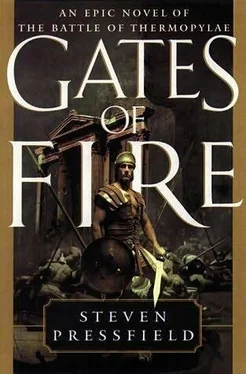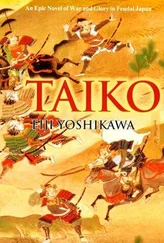Steven Pressfield - Gates of Fire - An Epic Novel of the Battle of Thermopylae
Здесь есть возможность читать онлайн «Steven Pressfield - Gates of Fire - An Epic Novel of the Battle of Thermopylae» весь текст электронной книги совершенно бесплатно (целиком полную версию без сокращений). В некоторых случаях можно слушать аудио, скачать через торрент в формате fb2 и присутствует краткое содержание. Жанр: Историческая проза, на английском языке. Описание произведения, (предисловие) а так же отзывы посетителей доступны на портале библиотеки ЛибКат.
- Название:Gates of Fire: An Epic Novel of the Battle of Thermopylae
- Автор:
- Жанр:
- Год:неизвестен
- ISBN:нет данных
- Рейтинг книги:3 / 5. Голосов: 1
-
Избранное:Добавить в избранное
- Отзывы:
-
Ваша оценка:
- 60
- 1
- 2
- 3
- 4
- 5
Gates of Fire: An Epic Novel of the Battle of Thermopylae: краткое содержание, описание и аннотация
Предлагаем к чтению аннотацию, описание, краткое содержание или предисловие (зависит от того, что написал сам автор книги «Gates of Fire: An Epic Novel of the Battle of Thermopylae»). Если вы не нашли необходимую информацию о книге — напишите в комментариях, мы постараемся отыскать её.
Gates of Fire: An Epic Novel of the Battle of Thermopylae — читать онлайн бесплатно полную книгу (весь текст) целиком
Ниже представлен текст книги, разбитый по страницам. Система сохранения места последней прочитанной страницы, позволяет с удобством читать онлайн бесплатно книгу «Gates of Fire: An Epic Novel of the Battle of Thermopylae», без необходимости каждый раз заново искать на чём Вы остановились. Поставьте закладку, и сможете в любой момент перейти на страницу, на которой закончили чтение.
Интервал:
Закладка:
The Greek was directed by Orontes, captain of the Immortals, to identify himself. He responded that his name was Xe-ones the son of Sfcamandridas of Astakos, a city in Akamania. The man Xeones stated that he wished jSrst to thank His Majesty for preserving his life and to express his gratitude for and admiration of the skill of the Royal Surgeon's staff. Speaking from his Utter, and yet struggling with weakness of breath from several as-yet-unhealed wounds of iKe lungs and thoracic organs, he offered the following disclaimer to His Majesty, stating that he was unfamiliar with the Persian style of discourse and further stood unfortunately lacking in the gifts of poesy and story-spinning. He declared that the tale he could tell would not be of generals or kings, for the political machinations of the great, he said, he was and had been in no position to observe. He could only relate the story as he himself had lived it and witnessed it, from the vantage of a youth and squire of the heavy infantry, a servant of the battle train. Perhaps, the captive declared, His Majesty would discover little of interest in this narrative of the ordinary warriors, the men m the line, as the prisoner expressed it.
His Majesty, responding through Orontes, Captain of the Immortals, asserted to the contrary that this was precisely the tale he wished most to hear. His Majesty was, He declared, already possessed of abundant intelligence of the intrigumgs of the great; what He desired most to hear was this, the infantryman's tale.
What kind of men were these Spartans, who in three days had slain before His Majesty's eyes no fewer than twenty thousand of His most valiant warriors' Who were these foemen, who had taken with them to the house of the dead ten, or as some reports said, as many as twenty for every one of their own fallen? What were they like as men? Whom did they love? What made them laugh.
His Majesty knew they feared death, as all men. By what philosophy did their minds embrace it?
Most to the point, His Majesty said, He wished to acquire a sense of the individuals themselves, the real flesh-and-blood men whom He had observed from above the battlefield, but only indistinctly, from a distance, as indistinguishable identities concealed within the blood- and gorebegrimed carapaces of their helmets and armor.
Beneath his cloth-bound eyes, the prisoner bowed and offered a prayer of thanksgiving to some one of his gods. The story His Majesty wished to hear, he asserted, was the one he could truly tell, and the one he most wished to.
It must of necessity be his own story, as well as that of the warriors he had known. Would His Majesty be patient with this.' Nor could the telling confine itself exclusively to the battle, but must proceed from events antecedent in time, for only in this light and from this perspective would the lives and actions of the warriors His Majesty observed at Thermopylae be given their true meaning and significance.
His Majesty, field marshals, generals and advisors being satisfied, the Greek was given a bowl of wme and honey for his thirst and asked to commence where he pleased, to tell the story in whatever manner he deemed appropriate. The man, Xeones, bowed once upon his litter and began:
I had always wondered what it felt like to die. There was an exercise we of the battle train practiced when we served as punching bags for the Spartan heavy infantry. It was called the Oak because we took our positions along a line of oaks at the edge of the plain of Otona, where the Spartiates and the Gentleman-Rankers ran their field exercises in fall and winter. We would line up ten deep with body-length wicker shields braced upon the earth and they would hit us, the shock troops, coming across the flat in line of battle, eight deep, at a walk, then a pace, then a trot and finally a dead run. The shock of their interleaved shields was meant to knock the breath out of you, and it did. It was like being hit by a mountain. Your knees, no matter how braced you held them, buckled like saplings before an earthshde; in an instant all courage fled our hearts; we were rooted up like dried stalks before the ploughman's blade.
That was how it felt to die. The weapon which slew me at Thermopylae was an Egyptian hoplite spear, driven in beneath the plexus of the rib cage. But the sensation was not what one would have anticipated, not being pierced but rather slammed, like we sparring fodder felt beneath the oaks.
I had imagined that the dead would be detached. Thatthey would look upon life with the eyes of objective wisdom. But the experience proved the opposite. Emotion ruled. It seemed nothing remained but emotion. My heart ached and broke as never it could on earth. Loss encompassed me with a searing, all-mastering pain. I saw my wife and children, my dear cousin Diomache, she whom I loved. I saw Skaman-dridas, my father, and Eunike, my mother, Bruxieus, Dekton and Suicide, names which mean nothing to His Majesty to hear, but which to me were dearer than life and now, dying, dearer still.
Away they flew. Away I flew from them.
I was keenly conscious of the comrades-in-arms who had fallen with me. A bond surpassing by a hundredfold that which I had known in life bound me to them. I felt a sense of inexpressible relief and realized that I had feared, more than death, separation from them. I apprehended that excruciating war survivor's torment, the sense of isolation and self-betrayal experienced by those who had elected to cling yet to breath when their comrades had let loose their grip.
That state which we call life was over.
I was dead.
And yet, titanic as was that sense of loss, there existed a keener one which I now experienced and felt my brothers-in-arms feeling with me. It was this.
That our story would perish with us.
That no one would ever know.
I cared not for myself, for my own selfish or vainglorious purposes, but for them. For Leonidas, for Alexandras and Polynikes, for Arete bereft by her hearth and, most of all, for Dienekes. That his valor, his wit, his private thoughts that I alone was privileged to share, that these and all that he and his companions had achieved and suffered would simply vanish, drift away like smoke from a woodland fire, this was unbearable.
We had reached the river now. We could hear with ears that were no longer ears and see with eyes that were no longer eyes the stream of Lethe and the hosts of the long-suffering dead whose round beneath the earth was at last drawing to a period. They were returning to life, drinking of those waters which would efface all memory of their existence here as shades. But we from Thermopylae, we were aeons away from drinking of Lethe's stream. We remembered.
A cry which was not a cry but only the multiplied pain of the warriors' hearts, all feeling what I, too, felt, rent the baleful scene with unspeakable pathos.
Then from behind me, if there can be such a thing as behind in that world where all directions are as one, came a glow of such sublimity that I knew, we all knew at once, it could be nothing but a god.
Phoebus Far Darter, Apollo himself in war armor, moved there among the Spartiates and Thespians. No words were exchanged; none were needed. The Archer could feel the men's agony and they knew without speech that he, warrior and physician, was there to succor it. So quickly that surprise was impossible I felt his eye turn toward me, me the last and least who could expect it, and then Dienekes himself was beside me, my master in life.
I would be the one. The one to go back and speak. A pain beyond all previous now seized me.
Sweet life itself, even the desperately sought chance to tell the tale, suddenly seemed unendurable alongside the pain of having to take leave of these whom I had come so to love.
But again, before the god's majesty, no entreaty was possible.
Читать дальшеИнтервал:
Закладка:
Похожие книги на «Gates of Fire: An Epic Novel of the Battle of Thermopylae»
Представляем Вашему вниманию похожие книги на «Gates of Fire: An Epic Novel of the Battle of Thermopylae» списком для выбора. Мы отобрали схожую по названию и смыслу литературу в надежде предоставить читателям больше вариантов отыскать новые, интересные, ещё непрочитанные произведения.
Обсуждение, отзывы о книге «Gates of Fire: An Epic Novel of the Battle of Thermopylae» и просто собственные мнения читателей. Оставьте ваши комментарии, напишите, что Вы думаете о произведении, его смысле или главных героях. Укажите что конкретно понравилось, а что нет, и почему Вы так считаете.












